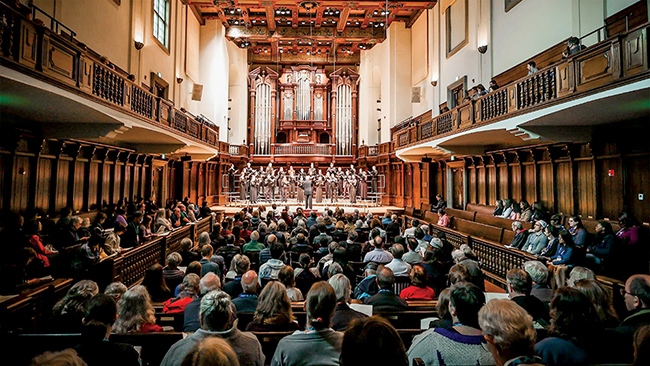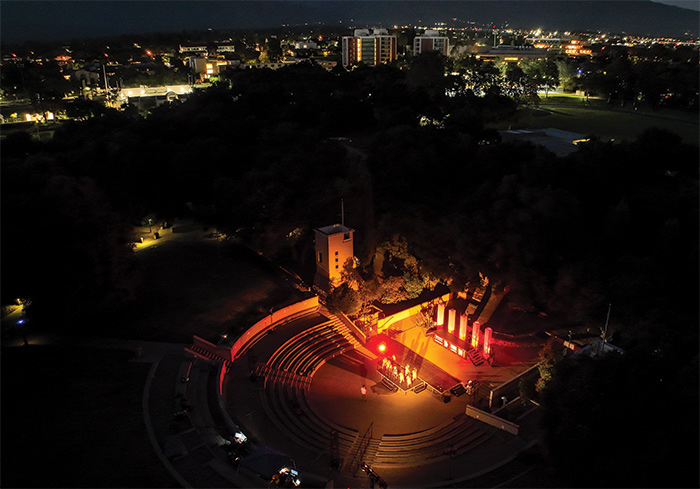CST, Consortium fight over value of Foothill-adjacent land
There’s a rift in the Claremont Colleges revolving around an age-old bone of contention: money.
The Claremont School of Theology (CST) is moving to an online hybrid model of education and wants to divest itself of some extra space. They plan to sell 10.5 acres of the 16.4-acre campus, including a parcel featuring the architecturally-significant Seeley-Mudd Theater.
CST wants $25 million for the land, located on College Avenue on the north side of Foothill Boulevard. The Claremont University Consortium (CUC), which has right of first refusal, says its entitled to the property for $4 million, based on the terms of the original agreement.
The Consortium says that the Claremont School of Theology refused a final offer of $14 million, which the Consortium says is more than generous. According to CST, the CUC has threatened the local seminary with legal action.
CST responded to the threat by filing a lawsuit against the Claremont University Consortium on August 31. The school also named the Claremont Graduate University in the suit.
Kim Edwards, interim director of communications for the Claremont School of Theology, says that the school has filed the suit with reservations. What’s more, she contends that CST’s only disagreement with the Consortium—a corporation providing shared services to Claremont’s undergraduate and graduate institutions—is about the asking price of the land.
Ms. Edwards, who started with CST a few months ago, insists the relationship between CST and the CUC has always been cordial. Nonetheless, with the argument over $11 million heating up, it’s apparent that, as with most families, the Claremont Colleges aren’t immune to conflict.
CST president Rev. Dr. Kah-Jin Jeffrey Kuan expressed regret over the way things have turned out.
“Our board of trustees authorized the filing of this legal action with great reluctance,” Rev. Dr. Kuan related in a statement. “We engaged in a good-faith effort to try to negotiate the sale of the land to the Consortium at a fair market price. After those negotiations broke down, the Consortium notified us that it would take action to assert a dubious claim to purchase the property at a price below what they offered. That is simply unacceptable.”
The dispute revolves around a clause in the agreement, made back in 1957, when the fledgling Claremont School of Theology bought the land for its operations from the predecessor to the Claremont University Consortium. At the time, the Consortium was part of the then Claremont Graduate School, which may explain CGU’s inclusion in the suit.
It stipulated that along with right of first refusal, the Consortium could choose between paying CST fair market value for its land or by relying on a formula. That formula is the equivalent of the original cost of the land—$110,000 back in 1957—plus the price of any assets or facilities added, minus depreciation.
In 2001, CUC approached then CST President Philip Amerson—who was at the start of a tenure that lasted until 2006—and asked him to sign a document renewing the agreement.
CUC says that by signing the document, President Amerson reactivated all clauses of the original real estate deal. They say they have offered CST “over $10 million more than the amount stipulated by the grant deed.”
What’s more, according to a release sent to the COURIER on Wednesday, CUC says it offered to bring some existing student housing units on the property up to code and give the college the option of continuing to house students there.
“The college presidents realize we could have repurchased the land at a much lower price, but wanted to do the right thing,” Consortium CEO Stig Lanesskog said. “We are quite disappointed by the actions taken by CST’s leadership given that they approached us about purchasing the land. We believe that [CST’s allegations of unfairness] are without merit.”
According to the release, when CST didn’t respond to the CUC’s offer by the August 11 deadline, Consortium officials notified the seminary “that without an agreement the terms of the original grant deed and 2001 agreement would remain in effect.”
CST, by contrast, alleges that CUC used fraudulent tactics to coerce the school into renewing an agreement featuring an obscure and long-expired real estate clause. Ms. Edwards says it is also important to note that the 2001 document was never recorded with the county clerk’s office.
CST has a lot at stake when it comes to real estate. The college is not just selling the land in question because it is underutilized. The seminary is under review for its accreditation by the Western Association of Schools and Colleges.
In light of monetary constraints at CST, the WASC review board has mandated that the school shore up its financial situation, with the sale of excess lands being among the top recommendations. CST was put on warning in February 2015 in regard to “financial sustainability.” CST made progress, and the WASC Senior College and University Commission team (WSCUSC) commended the college for its work toward correcting a $4 million shortfall. WSCUC will revisit CST this fall.
With the $25 million CST says is a fair price, the school could reconcile the debt. It could also, as outlined in its strategic plan, begin to renovate the facilities on the main campus core it plans to retain. First up would be upgrades to the library, which, like the other buildings, is more than 50 years old.
The age, and background, of CST facilities, which were master-planned and built by renowned mid-century architect Edward Durell Stone, are of interest to local preservationists.
There’s no easy formula for estimating the value of assets like the Mudd Theater, according to David Shearer, president of Claremont Heritage.
“It’s architecturally important. The whole campus is,” he said, emphasizing that the theater should be a candidate for adaptive reuse rather than destruction.
Ms. Edwards acknowledges that CST has had some financial difficulties of late, which have coincided with a downtick in the enrollment in theological seminaries nationwide.
But the college is remaining vital, she said, and, in fact, has welcomed a historically large population of some 385 students for the fall of 2016 by offering the convenience of online study and by broadening its outreach.
CST is “a Methodist-founded, ecumenical, interfaith campus,” Ms. Edwards told the COURIER, sharing that the incoming student body hails from 27 “faiths or practices,” 13 countries and 21 US states.
“We are building on a relatively simple educational philosophy: desegregating religious education so that students learn about others as they learn about themselves. It’s a groundbreaking approach to ministerial education and Christian formation. For some, this is a controversial approach; but research shows—and we know from experience—that students who learn in this environment gain a deeper appreciation of their own tradition while better understanding their neighbor’s faith and choices.
“Evidence of that played out this year when we hit a record enrollment level for Methodist students: 40 in our incoming class,” Ms. Edwards said. “The sale of this land, at fair-market value, supports our essential mission and the physical space needed to support it.”
—Sarah Torribio
storribio@claremont-courier.com
[Editor’s note: A previous version of this story online and in print on Friday, September 9 identified a $4 million offer by the Claremont University Consortium as “fair market value.” The $4 million figure is the value amount the CUC says is determined by the original 1957 agreement, not fair market value. Further, the CUC offered the Claremont School of Theology $14 million for the 10.5 acres of land, which the CUC considers fair. We apologize for the error. —KD]











0 Comments